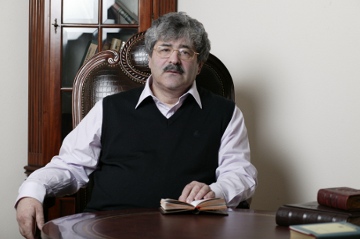
Not long ago, before the tragic events in Syria began, Anglican pastor Padgett went to Homs, Aleppo and Damascus, to study the situation of the Christian communities there. He mingled with people of different social status and religion. He wrote in the wake of his fresh impressions "Everywhere in these places Bashar Assad is seen as the" right "or only person capable of implementing gradual reforms, or at worst as the most preferred of the candidates that could guarantee social stability and freedom of religion ... Have we learned nothing from our previous experiences of interference in the Middle East?” So exclaimed the pastor.
One cannot say that the "hysteria" in the West about the veto of Russia and China in the anti-Syrian resolution at the Security Council indicates that they flatly refuse to understand the logic of Moscow and Beijing’s actions. If it is”hysteria", then it is controlled and managed.
The unpreparedness of the opposition to put forward a more or less coherent program for the rebuilding of Syria, except for the slogan "Down with Assad" is obvious to Washington and its allies. Today the Syrian opposition does not have a leader acceptable to the West and willing to provide a unifying platform. "In some cases, they hate each other more than the regime," said an expert from the Henry Jackson Society.
The backbone of the opposition in Libya were former military and government officials who had fled from Gaddafi’s government. On the contrary, the Syrian elite are fairly solid and loyal to their president. It is composed of members of the Alawite community, which is regarded as a sect by the rest of the country, so its members can’t "merge with" the general population, and as a result, they have no political or economic alternative than allegiance to Assad.
The opposition in Benghazi was led by experienced Libyan generals and even former ministers who managed to rally together those disaffected with the Gaddafi regime. The Syrian opposition is dogged by endless disputes between leftist groups and supporters of the pan-Arab Islamists, in particular the "Muslim Brotherhood."
Militarily, the Syrian army is stronger than the former army of Colonel Gaddafi, and has a much more powerful air defense system. But the important thing is that the Syrian opposition is not a fortified area in the country, which they can control and which could provide them with a rearguard. The foothold in Benghazi played an important role in the case of the Libyan opposition.
All these factors have led to the fact that so far in Syria there are a few scattered groups, but no one united functioning armed opposition group. It can be said that the organization of the army of Ukrainian anarcho- communist commander Makhno was much more disciplined.
After the well-known decision of the Security Council the question is raised: what actions will the U.S. and its allies take to consolidate and enhance the spirit and readiness of the so-called Free Syrian Army? One trend seems to have emerged - an attempt to engage other countries in the region in the conflict: the Qataris, Saudis, and the Turks.
According to some reports, the U.S. and Turkey are discussing the prospect of creating opposition outpost in north-west Syria, covered by a no-fly zone. In other words, it is about creating an analog to Benghazi in Libya, to which military and financial aid will flock, and, most importantly, foreign advisers and special groups could be ordered to infiltrate Syrian territory.
Any connection of the region to the active phase of the fight against al-Assad puts Iran in a dilemma in intervening directly in the conflict. In Iran, officials have already declared the right of Tehran to make preemptive strikes, bearing in mind, first and foremost on Israel. However, everyone, and especially the Iranians, understands that Syria is a prelude to the dismantling of Iran, which in the case of the rout of its ally will come closer to the military phase of the conflict, surrounded on all sides by enemies.
It is possible to tie down Iran by the actions of other countries, and its immediate and more distant neighbors in the region. However, any preemptive action by Iran, say, a missile attack on Israel, military aid to Syria, or the blocking of the Strait of Hormuz, would most likely will result in a military conflict on a massive scale. Here the roles are paradoxically split- if today Washington is tempering Israel, only Moscow can keep Iran from hasty action.
For the U.S. and its allies the main goal, of course, is not Syria, but Iran, and its connection to the Caspian energy basin, Central Asia and the Caucasus. The failure of the resolution in the Security Council, if it does not derail, then it postpones the achievement of this global goal.
Besides this, the situations in Tunisia, Libya, and especially the latest developments in Egypt, have caused doubt in the West in the validity of the further export of revolution. "It's one thing to change the regime, but the internal explosion that is shaking Syria, may not be the lesser evil," says one Western analyst.
It is no coincidence that venerable pastor Padgett reminds his fellows of an Arab proverb: "Better forty years of tyranny than one night of anarchy."
read more in our Telegram-channel https://t.me/The_International_Affairs

 12:04 09.02.2012 •
12:04 09.02.2012 •






















